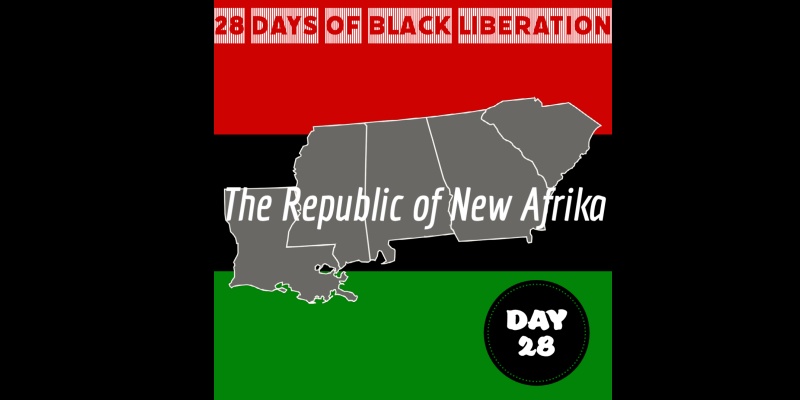Day 28 of the 28 Days of Black Liberation 2023 series
The Republic of New Afrika was founded in 1968 in Detroit by black nationalist and revolutionary organizations. The RNA embodied both a concept and an organization. RNA members and the idea of New Afrika have shaped a variety of foundational campaigns for reparations and the freedom of US political prisoners over the last half-century. In each of its campaigns, the New Afrikan framework has insisted on the centrality of land and power to any idea of Black politics. New Afrikan political thought synthesized long-prevalent strands of Black nationalism: cultural pride, anti-imperialism, spirituality, self-defense, self-governance, land ownership, and economic uplift.
The RNA advocated the creation of a separate nation for Black people—New Afrika—by carving territory from the five Black Belt states of the Deep South: Alabama, Georgia, Louisiana, Mississippi, and South Carolina where slavery was once most strongly concentrated. This position revived one held by the Communist Party in the 1930s and echoed by many of the small communist parties emerging in the 1970s, which held that the history of racial slavery and its afterlives had created a colonized people in the cotton belt South. However, New Afrikans argued that across the country Black people were colonized.
After fifty years, New Afrika remains a North Star for the Black Liberation struggle. The provisional government of the Republic of New Afrika still exists, hosting annual New Afrikan Nation Day celebrations to honor the history of the Black freedom struggle. Yet the most salient influence is likely to be found in the elastic, transformative concept of New Afrika itself. “New Afrika” can be found wherever people struggle for reparations, self-determination, the freedom of political prisoners, the eradication of police and vigilante violence, and—as seen today in Jackson, Mississippi—economic democracy and eco-socialism.

